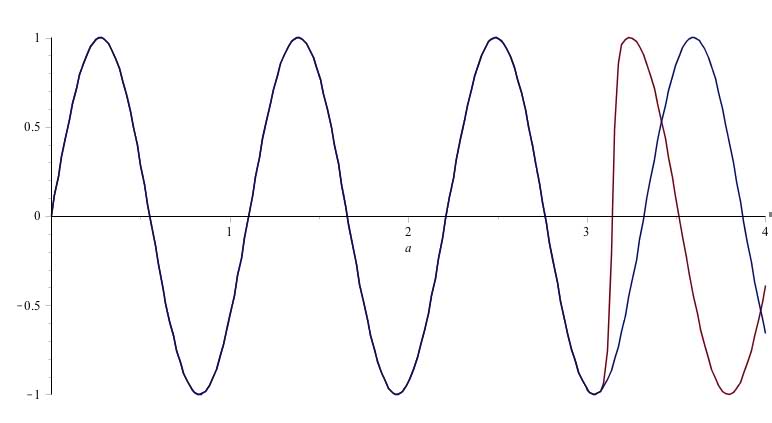Let's define half discrete-analytic function as a function whose Newton series converges to that function for each $x>0$:
$$f(x)=\sum_{k=0}^\infty \binom{x}k \Delta^k f\left (0\right)=\sum_{m=0}^{\infty} \binom {x}m \sum_{k=0}^m\binom mk(-1)^{m-k}f(k)=\lim_{n\to\infty}\frac{\sum_{k=0}^{n} \frac{(-1)^k f(k)}{(x-k)k!(n-k)!}}{\sum_{k=0}^{n} \frac{(-1)^k }{(x-k) k!(n-k)!}}$$
Let's define weak discrete-analytic a function a function whose bi-directional Newton expansion converges to that function at any real $x$:
$$f(x)=\lim_{n\to\infty}\frac{\sum _{k=-n}^n \frac{(-1)^k f(k)}{(x-k) (k+n)! (n-k)!}}{\sum _{k=-n}^n \frac{(-1)^k}{(x-k) (k+n)! (n-k)!}}$$
It seems that the function $\sin x$ is both half discrete-analytic and weak discrete-analytic. But the function $\sin \frac{\pi x}2$ is only weak discrete-analytic.
So what is the maximum $a$ such that $\sin ax$ is half discrete-analytic?
I also interested to know at which $a$ $\sin ax$ is weak discrete-analytic. For example, is $\sin 3x$ weak discrete-analytic or not?
This question is motivated by my old search for a natural fractional integration and integration constant (integral analog of Ramanjuan sum). I want to find a natural generalization of Newton series to functions whose Newton series normally diverges. Once that accomplished it would be possible to find Newton expansions for consecutive derivatives of a function and by analytically continuing them into negative domain, get natural integral. Unfortunately finding natural fractional integral of even such simple function as $\sin x$ requires building Newton expansion for $\sin \frac{\pi x}2$ which diverges.

